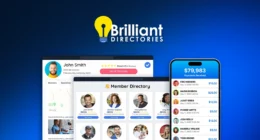Marketing mix modeling software helps businesses optimize their marketing investments through data-driven analytics and machine learning. These platforms integrate data from multiple channels, analyze historical performance, and provide actionable insights for budget allocation. Key features include real-time optimization, customizable frameworks, and predictive modeling capabilities. The software enables companies to simulate various marketing scenarios, track cross-channel effectiveness, and make informed decisions. Understanding its core components reveals how this technology transforms marketing strategy.
Quick Overview
- Marketing Mix Modeling Software analyzes historical data to determine which marketing channels contribute most effectively to overall sales performance.
- Advanced AI and machine learning capabilities enable precise forecasting and data-driven recommendations for optimal budget allocation.
- The software integrates data from multiple marketing channels while providing unified visualization dashboards for comprehensive performance analysis.
- Real-time optimization features allow marketers to make dynamic adjustments based on ongoing performance metrics across channels.
- Customizable frameworks adapt to specific business needs while offering simulation capabilities to reduce investment risks and improve outcomes.
Understanding the Core Benefits of Marketing Mix Modeling Software

As businesses aim to maximize their marketing effectiveness, Marketing Mix Modeling (MMM) software has emerged as a crucial tool for understanding and optimizing marketing investments. This powerful solution offers several core benefits that help companies make data-driven decisions.
The software excels at identifying which marketing channels contribute most substantially to sales performance, allowing businesses to allocate resources more efficiently. Through detailed analysis of historical data, MMM software can detect patterns and measure the ROI of specific campaigns. Modern MMM platforms help brands achieve optimal budget allocation across various marketing activities. Similar to platforms like cross-channel integration features in Salesforce Marketing Cloud, MMM software provides comprehensive analytics capabilities.
It also enables companies to simulate different marketing scenarios before making substantial investments, reducing risk and improving outcomes.
Furthermore, the software provides thorough cross-channel insights, revealing how different marketing efforts work together. This unified view helps organizations track performance continuously and make real-time adjustments to their marketing strategies.
Key Features That Drive Successful MMM Implementation
What distinguishes successful Marketing Mix Modeling (MMM) implementations from lackluster ones? The key lies in five essential features that work together to deliver actionable insights:
- Data integration capabilities that seamlessly combine information from multiple marketing channels while maintaining data quality and compliance
- Advanced AI and machine learning tools that enable precise forecasting and provide data-driven recommendations for budget optimization
- Customizable frameworks that adapt to specific business needs and scale with company growth
- Unified visualization dashboards that present clear, thorough views of marketing performance across all channels
- Real-time optimization features that allow for dynamic strategy adjustments based on ongoing performance analysis.
These core features guarantee that MMM software not only processes data effectively but also delivers practical insights that drive measurable business results. With marketing budgets now at just 7.7% of revenue, organizations must maximize the efficiency of every marketing dollar spent through sophisticated MMM implementation.
Selecting the Right Marketing Mix Modeling Platform

The selection of an appropriate Marketing Mix Modeling platform represents a critical decision that can substantially impact a company’s marketing success. Organizations must carefully evaluate their specific needs, resources, and long-term objectives when choosing a platform that aligns with their marketing strategy. Advanced platforms facilitate data-driven decisions that help organizations achieve higher marketing ROI and efficiency. Similar to how project automation enhances team efficiency in tools like monday.com, MMM platforms can streamline marketing analysis workflows.
Key considerations when selecting an MMM platform include:
- Business Scale Compatibility – Small businesses need user-friendly, cost-effective solutions, while enterprises require robust data integration and advanced analytics capabilities.
- Data Integration Features – Look for platforms that seamlessly connect with existing systems and handle multiple data sources.
- Transparency Level – Choose solutions that clearly explain their methodologies and demonstrate how actions affect KPIs.
- Cost-Value Balance – Consider total ownership costs, including training and maintenance, while evaluating potential ROI and payback periods.
Overcoming Common Challenges in MMM Software Adoption
Despite significant advances in marketing technology, organizations frequently encounter substantial hurdles when implementing Marketing Mix Modeling software solutions. The primary challenges include data quality issues, integration complexities, and resource constraints. Marketing attribution analysis faces unique difficulties when identifying causal relationships between marketing activities and sales outcomes.
To overcome these obstacles, companies should:
- Start with a data audit to verify at least 2 years of clean, consistent historical information
- Implement systematic data collection processes across all channels
- Invest in data integration tools to break down departmental silos
- Begin with smaller-scale pilots before full implementation
- Develop clear validation metrics to build stakeholder trust
- Partner with experienced vendors who offer thorough training
- Create cross-functional teams to manage implementation
- Set realistic timelines for model development and calibration
- Establish regular review cycles to maintain model accuracy
These strategic steps help organizations navigate common MMM adoption challenges while maximizing their software investment.
Best Practices for Maximizing ROI With MMM Tools

Successfully implementing MMM software sets the foundation for maximizing return on investment, but organizations must follow specific best practices to tap the full potential of these powerful tools. To achieve superior results, companies should focus on these essential practices:
- Maintain fresh, clean data through regular updates and preprocessing, ensuring the model reflects current market conditions and produces accurate insights.
- Utilize advanced analytics techniques, including machine learning and predictive modeling, to uncover deeper patterns in marketing performance.
- Analyze cross-channel interactions carefully to identify synergies and eliminate wasteful overlaps in marketing spending.
- Create clear, actionable reports with strong visualizations that help stakeholders quickly understand key findings and make informed decisions.
Regular testing and strategic adaptation keep the model relevant and effective over time, leading to continuous improvement in marketing ROI. Modern MMM platforms integrate real-time data and predictive analytics to provide precise recommendations for future marketing investments.
Frequently Asked Questions
How Long Does It Typically Take to Implement a New MMM Software?
The implementation timeline for new MMM software typically ranges from 3 to 6 months for enterprise-level organizations. Smaller companies may complete implementation in just a few weeks.
The process includes data collection (4-6 weeks), model building (4 weeks), and user training (8-12 weeks). Companies can speed up implementation by using prebuilt solutions, automating data integration, and working with experienced vendors who provide dedicated support throughout the process.
Can MMM Software Integrate With Existing CRM and Analytics Platforms?
Yes, modern MMM software readily integrates with existing CRM and analytics platforms.
Most solutions offer native integration with popular CRM systems like Salesforce and analytics tools such as Google Analytics or Adobe Experience Cloud.
These integrations enable seamless data flow, unified tracking of performance metrics, and enhanced reporting accuracy.
Through APIs and pre-built connectors, organizations can synchronize their MMM software with existing systems, though implementation may require robust data infrastructure and technical support.
What Level of Technical Expertise Is Required for Daily MMM Operation?
Daily MMM operations typically require moderate technical expertise. Users should have basic statistical knowledge, familiarity with data manipulation, and understanding of marketing metrics.
While advanced programming skills aren’t always necessary, operators need competency in:
- Using MMM software interfaces
- Interpreting data visualizations
- Running routine model updates
- Spotting data anomalies
- Creating basic reports
Most platforms offer user-friendly interfaces, but understanding core marketing concepts and basic analytics remains essential for effective operation.
How Often Should Marketing Mix Models Be Recalibrated for Optimal Performance?
Like a well-tuned engine, marketing mix models require regular maintenance. The best recalibration frequency depends on market dynamics and organizational needs. Fast-moving markets typically demand quarterly or semi-annual updates, while stable industries may suffice with annual recalibration.
Key factors determining frequency include:
- Market volatility
- Consumer behavior shifts
- New marketing channel introductions
- Data quality changes
- External economic factors
Companies should balance accuracy requirements with available resources when setting recalibration schedules.
What Are the Data Privacy Implications of Using Cloud-Based MMM Solutions?
Cloud-based MMM solutions require careful attention to data privacy across several key areas. Organizations must secure compliance with regulations like GDPR and CCPA, implement robust encryption for data protection, and maintain strict anonymization protocols. Federated learning approaches help process data without exposing sensitive information, while regular security audits maintain system integrity.
Companies must also establish clear data governance policies and communicate transparently with customers about data usage practices.
Conclusion
Marketing mix modeling software represents a pivotal turning point in how businesses optimize their marketing investments. While the journey to implementation may present certain hurdles, organizations that thoughtfully select and deploy MMM solutions position themselves to thrive in an increasingly complex marketplace. By embracing these powerful analytical tools and following proven best practices, companies can transform their marketing approach from intuition-based to data-driven, ultimately achieving superior returns on their marketing spend.








